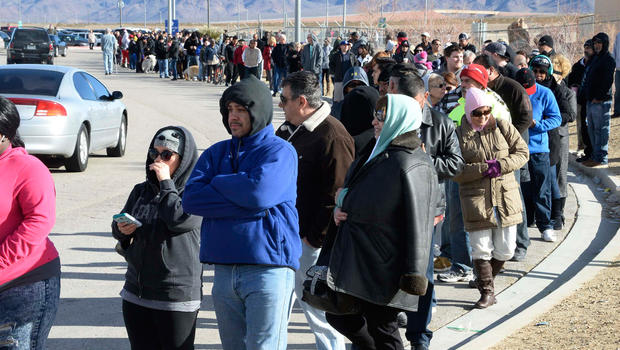Post by The Big Daddy C-Master on Jan 13, 2016 4:00:14 GMT -5
www.cbsnews.com/news/lottery-fever-record-1-billion-powerball-jackpot-available/
No ticket matched all six Powerball numbers following the drawing for a record jackpot of nearly $950 million, lottery officials said early Sunday, boosting the expected payout for the next drawing to a whopping $1.3 billion.
The winning numbers - disclosed live on television and online Saturday night - were 16-19-32-34-57 and the Powerball number 13. All six numbers must be correct to win, although the first five can be in any order.
Officials with the Multi-State Lottery Association, which runs the Powerball game, said they expected about 75 percent of the possible number combinations would have been bought for Saturday night's drawing.
12 PHOTOS
Luck Gone Bad: Lottery winners who lost it all
Since Nov. 4, the Powerball jackpot has grown from its $40 million starting point as no one has won the jackpot. Such a huge jackpot was just what officials with the Multi-State Lottery Association, which runs the Powerball game, hoped for last fall when they changed the odds of matching all the Powerball numbers, from about one in 175 million to one in 292.2 million. By making it harder to win a jackpot, the tougher odds made the ever-larger prizes inevitable.
The U.S. saw sales of $277 million on Friday alone and more than $400 million were expected Saturday, according to Gary Grief, the executive director of the Texas Lottery.
The record jackpot lured an unprecedented frenzy of purchases.
Powerball is played in 44 states as well as the District of Columbia, U.S. Virgin Islands and Puerto Rico. The next Powerball drawing is Wednesday.

Here's a rundown of some key figures - if not the winning numbers - connected to the drawing.
___
JACKPOT
Saturday's nearly $950 million jackpot already was the largest in U.S. history, but after Saturday night's rollover, Wednesday's drawing will be worth $1.3 billion, said Texas Lottery official Kelly Cripe.
ODDS OF WINNING
To put it gently, not good. The odds of winning Saturday's jackpot were one in 292.2 million. Realistically, you were really, really, really unlikely to win. One hopeful thought: Scott A. Norris, an assistant professor of mathematics at Southern Methodist University, says your tiny odds improve a bit if you let the computer pick your numbers rather than choosing yourself.
POSSIBLE NUMBER COMBINATIONS
There are 292.2 million possible combinations of the five white balls and red Powerball. That's where the one in 292.2 million odds comes from, and they stay the same regardless of how big the jackpot grows or how many people buy tickets.
LUMP SUM VS. LIFETIME PAYOUT
Once you beat the astronomical odds and win, you'll get to choose between being paid $1.3 billion through annual payments over 29 years or one $806 million cash payment. Those figures are before federal and state taxes, which will eat up roughly half of the cash-option prize. What's your best bet? Olivia S. Mitchell, a professor of insurance and risk management at the Wharton School at the University of Pennsylvania, says a safe option to avoid the risk of overspending or an investment mishap would be to take the annuity.
SINCE THE LAST WINNER
The jackpot started at $40 million on Nov. 4 and has been growing since then because there have been no big winners for the twice-weekly jackpots. Because the payout is based on sales, the prize has grown more quickly as people rush to buy tickets. More ticket sales also make it more likely there will be a winner, as all the extra tickets mean more number combinations are covered.
STATES WHERE THE GAME IS PLAYED
Powerball is played in 44 states as well as the District of Columbia, U.S. Virgin Islands and Puerto Rico.
BUYING TICKETS
A regular ticket costs $2 - about the same as a gallon of gas.
LOTTERY HISTORY IN THE MAKING
The Powerball jackpot for Wednesday night's drawing will be $1.3 billion. While that's the largest U.S. lottery jackpot ever, lotteries elsewhere in the world can be far bigger. Spain's massively popular Christmas lottery, known as "El Gordo," is ranked as the world's richest and last month showered 2.2 billion euros ($2.4 billion) across the country in millions of prizes.
As for the U.S., here's a look at the 10 previous highest jackpots and where the winners were from:
1. $656.0 million, Mega Millions, March 30, 2012 (3 tickets from Kansas, Illinois and Maryland)
2. $636 million, Mega Millions Dec 17, 2013, (2 tickets, from California and Georgia)
3. $590.5 million, Powerball, May 18, 2013 (1 ticket from Florida)
4. $587.5 million, Powerball, Nov. 28, 2012 (2 tickets from Arizona and Missouri)
5. $564.1 million, Powerball, Feb 11, 2015 - (3 tickets, from North Carolina, Puerto Rico and Texas)
6. $448.4 million, Powerball, Aug 7, 2013, (3 tickets, one from Minnesota and two from New Jersey)
7. $425.3 million, Powerball, Feb 19, 2014 - (1 ticket from California)
8. $414 million, Mega Millions, March 18, 2014, (2 tickets from Florida and Maryland)
9. $399.4 million, Powerball, Sept 18, 2013, (1 ticket from South Carolina)
10. $390.0 million, Mega Millions, March 6, 2007 (2 tickets from Georgia and New Jersey)
No ticket matched all six Powerball numbers following the drawing for a record jackpot of nearly $950 million, lottery officials said early Sunday, boosting the expected payout for the next drawing to a whopping $1.3 billion.
The winning numbers - disclosed live on television and online Saturday night - were 16-19-32-34-57 and the Powerball number 13. All six numbers must be correct to win, although the first five can be in any order.
Officials with the Multi-State Lottery Association, which runs the Powerball game, said they expected about 75 percent of the possible number combinations would have been bought for Saturday night's drawing.
12 PHOTOS
Luck Gone Bad: Lottery winners who lost it all
Since Nov. 4, the Powerball jackpot has grown from its $40 million starting point as no one has won the jackpot. Such a huge jackpot was just what officials with the Multi-State Lottery Association, which runs the Powerball game, hoped for last fall when they changed the odds of matching all the Powerball numbers, from about one in 175 million to one in 292.2 million. By making it harder to win a jackpot, the tougher odds made the ever-larger prizes inevitable.
The U.S. saw sales of $277 million on Friday alone and more than $400 million were expected Saturday, according to Gary Grief, the executive director of the Texas Lottery.
The record jackpot lured an unprecedented frenzy of purchases.
Powerball is played in 44 states as well as the District of Columbia, U.S. Virgin Islands and Puerto Rico. The next Powerball drawing is Wednesday.

Here's a rundown of some key figures - if not the winning numbers - connected to the drawing.
___
JACKPOT
Saturday's nearly $950 million jackpot already was the largest in U.S. history, but after Saturday night's rollover, Wednesday's drawing will be worth $1.3 billion, said Texas Lottery official Kelly Cripe.
ODDS OF WINNING
To put it gently, not good. The odds of winning Saturday's jackpot were one in 292.2 million. Realistically, you were really, really, really unlikely to win. One hopeful thought: Scott A. Norris, an assistant professor of mathematics at Southern Methodist University, says your tiny odds improve a bit if you let the computer pick your numbers rather than choosing yourself.
POSSIBLE NUMBER COMBINATIONS
There are 292.2 million possible combinations of the five white balls and red Powerball. That's where the one in 292.2 million odds comes from, and they stay the same regardless of how big the jackpot grows or how many people buy tickets.
LUMP SUM VS. LIFETIME PAYOUT
Once you beat the astronomical odds and win, you'll get to choose between being paid $1.3 billion through annual payments over 29 years or one $806 million cash payment. Those figures are before federal and state taxes, which will eat up roughly half of the cash-option prize. What's your best bet? Olivia S. Mitchell, a professor of insurance and risk management at the Wharton School at the University of Pennsylvania, says a safe option to avoid the risk of overspending or an investment mishap would be to take the annuity.
SINCE THE LAST WINNER
The jackpot started at $40 million on Nov. 4 and has been growing since then because there have been no big winners for the twice-weekly jackpots. Because the payout is based on sales, the prize has grown more quickly as people rush to buy tickets. More ticket sales also make it more likely there will be a winner, as all the extra tickets mean more number combinations are covered.
STATES WHERE THE GAME IS PLAYED
Powerball is played in 44 states as well as the District of Columbia, U.S. Virgin Islands and Puerto Rico.
BUYING TICKETS
A regular ticket costs $2 - about the same as a gallon of gas.
LOTTERY HISTORY IN THE MAKING
The Powerball jackpot for Wednesday night's drawing will be $1.3 billion. While that's the largest U.S. lottery jackpot ever, lotteries elsewhere in the world can be far bigger. Spain's massively popular Christmas lottery, known as "El Gordo," is ranked as the world's richest and last month showered 2.2 billion euros ($2.4 billion) across the country in millions of prizes.
As for the U.S., here's a look at the 10 previous highest jackpots and where the winners were from:
1. $656.0 million, Mega Millions, March 30, 2012 (3 tickets from Kansas, Illinois and Maryland)
2. $636 million, Mega Millions Dec 17, 2013, (2 tickets, from California and Georgia)
3. $590.5 million, Powerball, May 18, 2013 (1 ticket from Florida)
4. $587.5 million, Powerball, Nov. 28, 2012 (2 tickets from Arizona and Missouri)
5. $564.1 million, Powerball, Feb 11, 2015 - (3 tickets, from North Carolina, Puerto Rico and Texas)
6. $448.4 million, Powerball, Aug 7, 2013, (3 tickets, one from Minnesota and two from New Jersey)
7. $425.3 million, Powerball, Feb 19, 2014 - (1 ticket from California)
8. $414 million, Mega Millions, March 18, 2014, (2 tickets from Florida and Maryland)
9. $399.4 million, Powerball, Sept 18, 2013, (1 ticket from South Carolina)
10. $390.0 million, Mega Millions, March 6, 2007 (2 tickets from Georgia and New Jersey)





